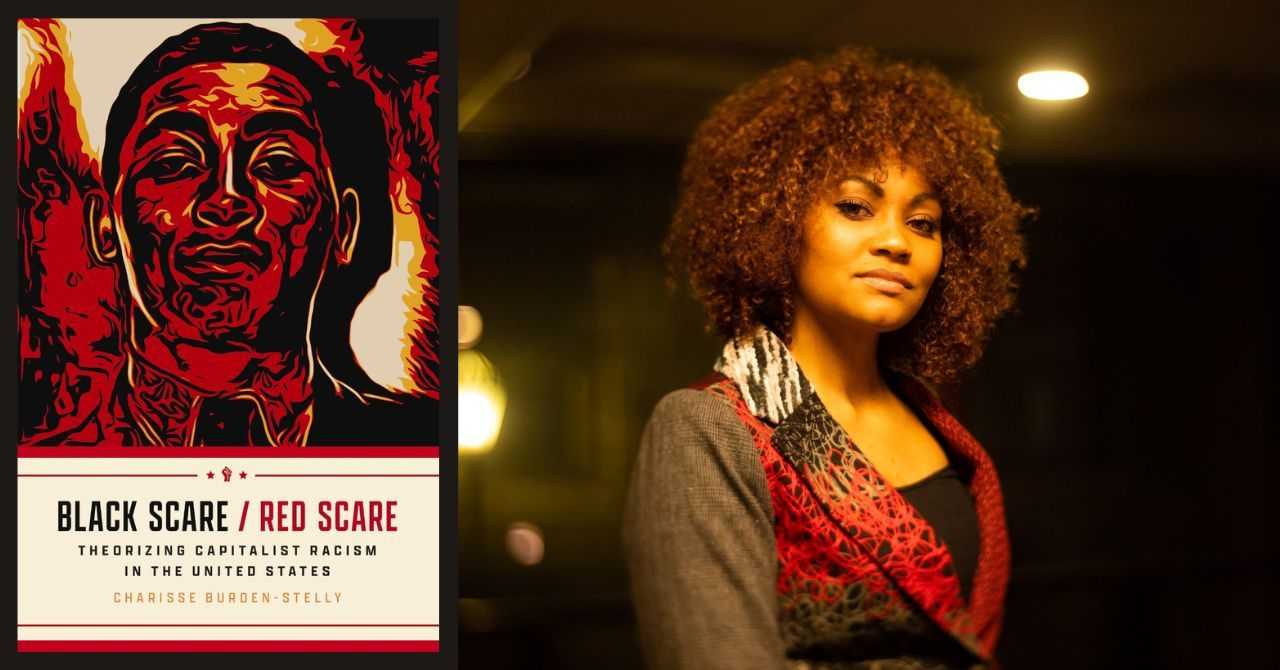- Cafe
- Bookstore
- Upcoming events
- Book an event
- Catering
- Institutional and bulk sales
- About Red Emma's
- Press
- Buy gift cards
- Red Emma's merch
- Donate to the Red Emma's Education Fund

Charisse Burden-Stelly presents "Black Scare/Red Scare: Theorizing Capitalist Racism in the United States" in conversation w/Erica Caines
This event has already happened.
In the early twentieth century, two panics emerged in the United States. The Black Scare was rooted in white Americans’ fear of Black Nationalism and dread at what social, economic, and political equality of Black people might entail. The Red Scare, sparked by communist uprisings abroad and subversion at home, established anticapitalism as a force capable of infiltrating and disrupting the American order. In Black Scare / Red Scare, Charisse Burden-Stelly meticulously outlines the conjoined nature of these state-sanctioned panics, revealing how they unfolded together as the United States pursued capitalist domination. Antiradical repression, she shows, is inseparable from anti-Black oppression, and vice versa.
Beginning her account in 1917—the year of the Bolshevik Revolution, the East St. Louis Race Riot, and the Espionage Act—Burden-Stelly traces the long duration of these intertwined and mutually reinforcing phenomena. She theorizes two bases of the Black Scare / Red Scare: US Capitalist Racist Society, a racially hierarchical political economy built on exploitative labor relationships, and Wall Street Imperialism, the violent processes by which businesses and the US government structured domestic and foreign policies to consolidate capital and racial domination. In opposition, Radical Blackness embodied the government’s fear of both Black insurrection and Red instigation. The state’s actions and rhetoric therefore characterized Black anticapitalists as foreign, alien, and undesirable. This reactionary response led to an ideology that Burden-Stelly calls True Americanism, the belief that the best things about America were absolutely not Red and not Black, which were interchangeable threats.
Black Scare / Red Scare illuminates the anticommunist nature of the US and its governance, but also shines a light on a misunderstood tradition of struggle for Black liberation. Burden-Stelly highlights the Black anticapitalist organizers working within and alongside the international communist movement and analyzes the ways the Black Scare/Red Scare reverberates through ongoing suppression of Black radical activism today. Drawing on a range of administrative, legal, and archival sources, Burden-Stelly incorporates emancipatory ideas from several disciplines to uncover novel insights into Black political minorities and their legacy.
“Burden-Stelly is not content with simply contributing to existing scholarship. She shakes things up. And Black Scare / Red Scare hits with volcanic force, sweeping away the prevailing tendency to underestimate the Black Marxist threat to racial capitalism and the embedded anti-Blackness driving state repression. Burden-Stelly details precisely how the ‘political economy of capitalist racism’ played a decisive role in the super-exploitation and subjugation of the Black working class, resulting in a protracted war on Black radical movements. A powerful, pathbreaking work that not only reorients the long history of anticommunism on Black liberation but moves the theory of racial capitalism to an entirely new level.” Robin D. G. Kelley, author of Freedom Dreams: The Black Radical Imagination
“Burden-Stelly is one of our most brilliant radical thinkers and scholars. In Black Scare / Red Scare she recounts, reassesses, and reframes the historical relationship between white supremacy and anti-communism. In light of growing racist authoritarian movements today, the book could not be more timely. Powerful and powerfully relevant.” Barbara Ransby, historian, activist, and author of the award-winning Ella Baker and the Black Freedom Movement
Charisse Burden-Stelly is a critical Black Studies scholar of political theory, political economy, and intellectual history. Her research pursues two complementary lines of inquiry. The first interrogates the transnational entanglements of U.S. capitalist racism, anticommunism, and antiblack racial oppression. Her second area of focus examines twentieth-century Black anticapitalist intellectual thought, theory, and praxis. She is the co-author, with Dr. Gerald Horne, of W.E.B. Du Bois: A Life in American History, and her single-authored book titled Black Scare/Red Scare: Theorizing Capitalist Racism in the United States is forthcoming in November 2023. She is also the co-editor, with Dr. Jodi Dean, of Organize, Fight, Win: Black Communist Women’s Political Writings (Verso, 2022) _and the co-editor, with Dr. Aaron Kamugisha and Dr. Percy Hintzen, of the latter’s writings titled _Reproducing Domination: On the Caribbean and the Postcolonial State. Additionally, she guest edited the “Claudia Jones: Foremother of World Revolution” special issue of The Journal of Intersectionality. Her published work appears in journals including Small Axe, Monthly Review, Souls, Du Bois Review, Socialism & Democracy, International Journal of Africana Studies, CLR James Journal, _and _American Communist History _and in popular venues including _Monthly Review, Boston Review, Essence _magazine, and _Black Agenda Report. She has been interviewed on podcasts, radio shows, and news show including The Real News Network, Breakthrough News, Millennials Are Killing Capitalism _podcast, _The Red Nation _podcast, _AJ+, _By Any Means Necessary _news show, _Bad Faith _podcast, and _The Katie Halper _show.
Erica Caines is a poet, writer and organizer in Baltimore and the DMV. She is an organizing committee member of the anti war coalition, the Black Alliance For Peace as well as an outreach member of the Black centered Ujima People’s Progress Party. Caines founded Liberation Through Reading in 2017 as a way to provide Black children with books that represent them and created the extension, a book club entitled Liberation Through Reading BC, to strengthen political education online and in our communities.

